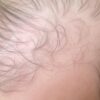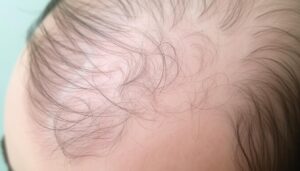Millions of people take Vyvanse to help with ADHD. But, some wonder if it can cause hair loss. You’ll find out if there’s a link between Vyvanse and hair loss.

Key Takeaways
- Vyvanse, a popular ADHD medication, has been associated with potential hair loss in some users.
- Understanding the mechanism behind this connection is crucial for individuals taking Vyvanse to make informed decisions about their treatment.
- Factors such as dosage, individual biology, and duration of use may play a role in the risk of Vyvanse-related hair loss.
- Solution for hair loss: Scalp Micropigmentation
Understanding Vyvanse: An Overview
What is Vyvanse?
Vyvanse is also known as lisdexamfetamine dimesylate. It’s a prodrug that needs to be broken down in the body to work. This makes it different from other ADHD meds like Aderall.
After you take Vyvanse, it turns into dextroamphetamine. This active part then boosts focus, concentration, and impulse control.
How Does Vyvanse Work?
Vyvanse increases dopamine and norepinephrine in the brain. These neurotransmitters help with mood, attention, and thinking.
By boosting these neurotransmitters, Vyvanse helps ADHD symptoms. This leads to better school, social, and work performance.
But, Vyvanse might cause side effects like vyvanse hair thinning. It’s key to talk to your doctor about the benefits and risks. They can also discuss other options, like vyvanse vs adderall hair loss.
What is Hair Loss?
Hair loss is a common issue that can affect individuals of all ages and genders. While there’s a myriad of reasons behind hair thinning or shedding, one aspect that has gained attention is the potential impact of certain medications on hair health.
Among these medications, Vyvanse, a prescription drug primarily used to treat attention deficit hyperactivity disorder (ADHD), has been queried regarding its association with hair loss. Many users have reported experiencing hair loss while on Vyvanse, leading to concerns about whether this medication could indeed contribute to their condition.
The subject of Vyvanse hair loss has prompted discussions among medical professionals and patients alike. It is essential to note that hair loss is a multifactorial issue, influenced by genetics, hormonal changes, nutritional deficiencies, and even stress.
While some individuals may notice an increase in hair shedding after starting Vyvanse, it is crucial to assess whether the medication is the sole factor or just one of several contributors to the changes in hair growth. Factors like underlying health conditions, lifestyle, and even the body’s reaction to new medications can interplay to influence hair health.
Can Vyvanse Cause Hair Loss?
Does vyvanse cause hair loss? Vyvanse, a common ADHD medication, has raised concerns about hair loss. The exact reasons for this side effect are still unclear. Yet, studies hint that Vyvanse might cause hair loss in some people.
Some think Vyvanse, with its active ingredient lisdexamfetamine, can mess with hair growth. It affects the brain and might also change hormone levels. This could lead to thinner or falling hair.
It’s worth noting that hair loss from Vyvanse is rare. Not everyone who takes it will lose hair. But, for those who do, the hair usually grows back once they stop taking Vyvanse or change their dosage.
Conclusion
Vyvanse can lead to hair loss, but not to worry ScalpMasters is here to help with scalp micropigmentation (SMP). A non-invasive procedure that can make your hair look fuller and help you gain your confidence back.
Come visit ScalpMasters, where you can start your journey of looking and feeling great again! We have amazing experts that will help you every step of the way. If you want to know more or you are ready to get started, contact us today.










